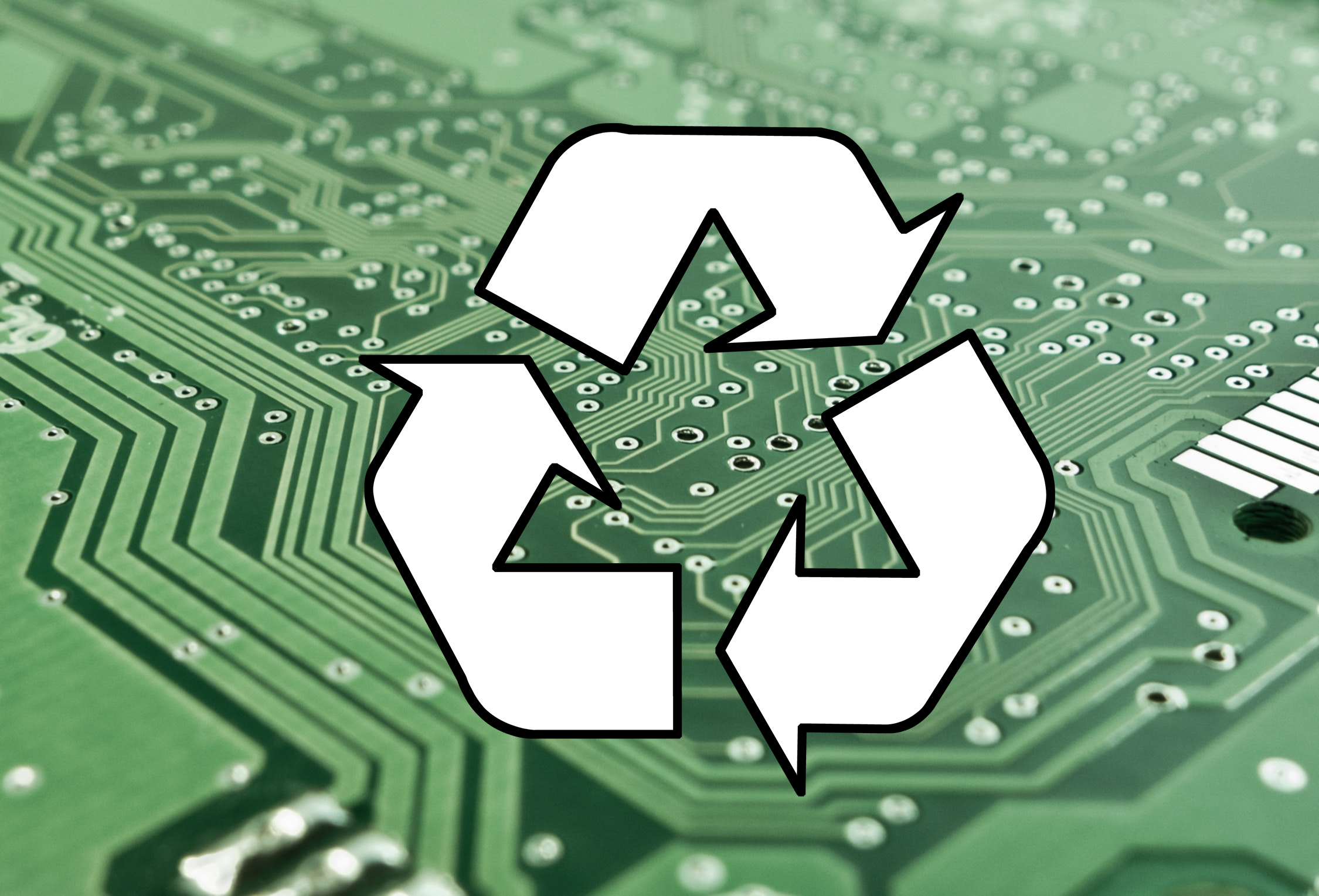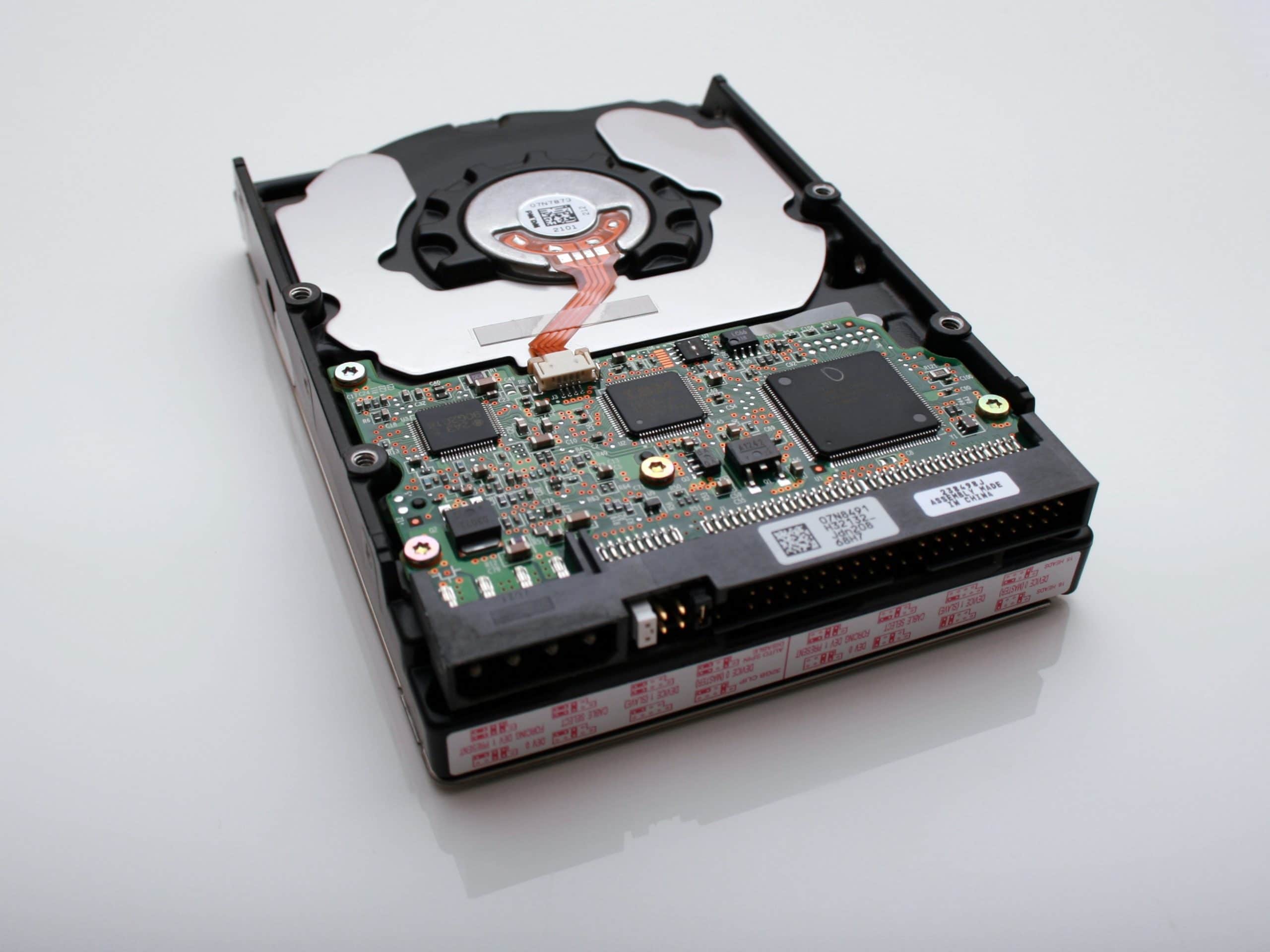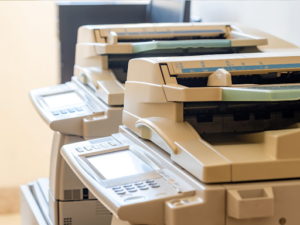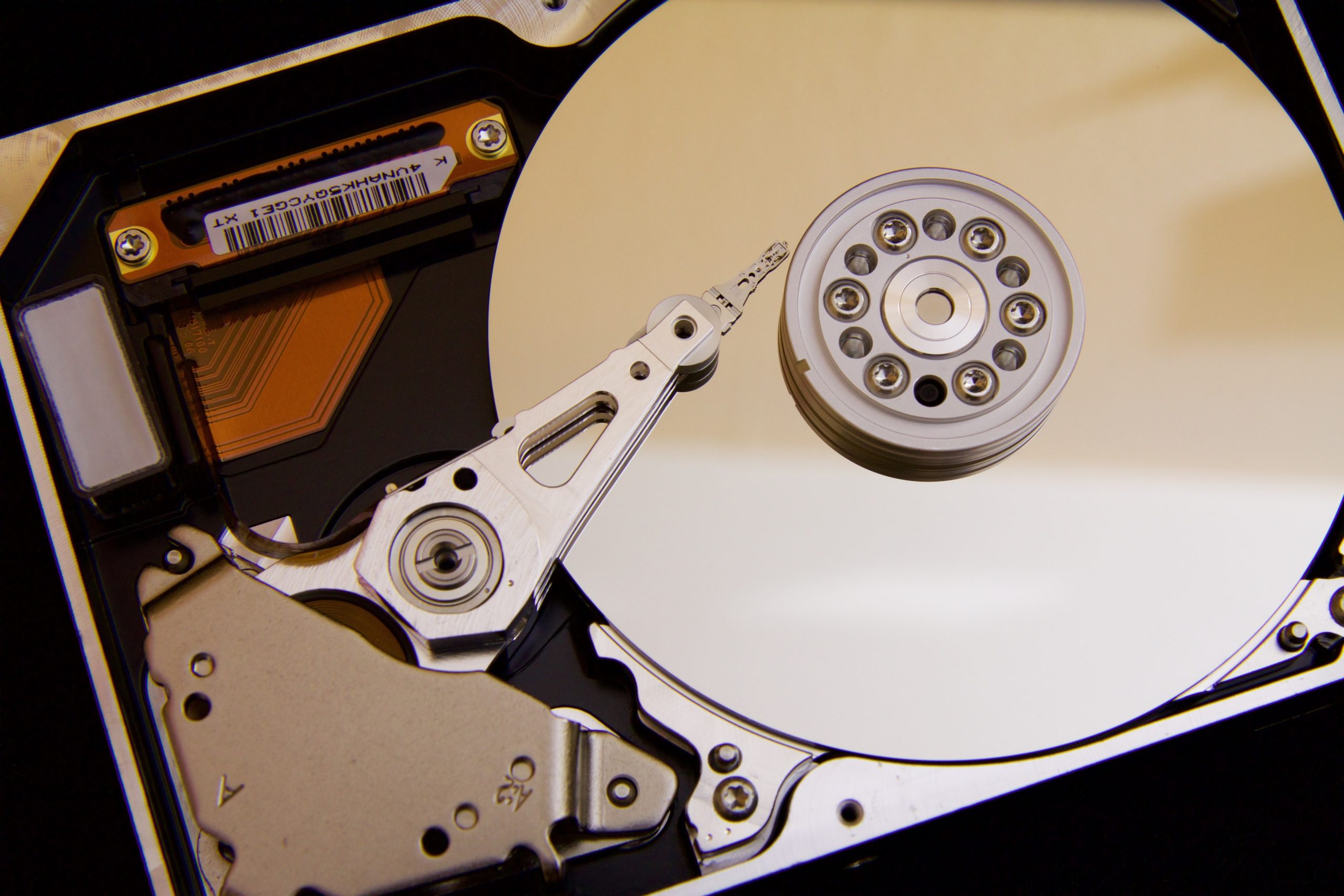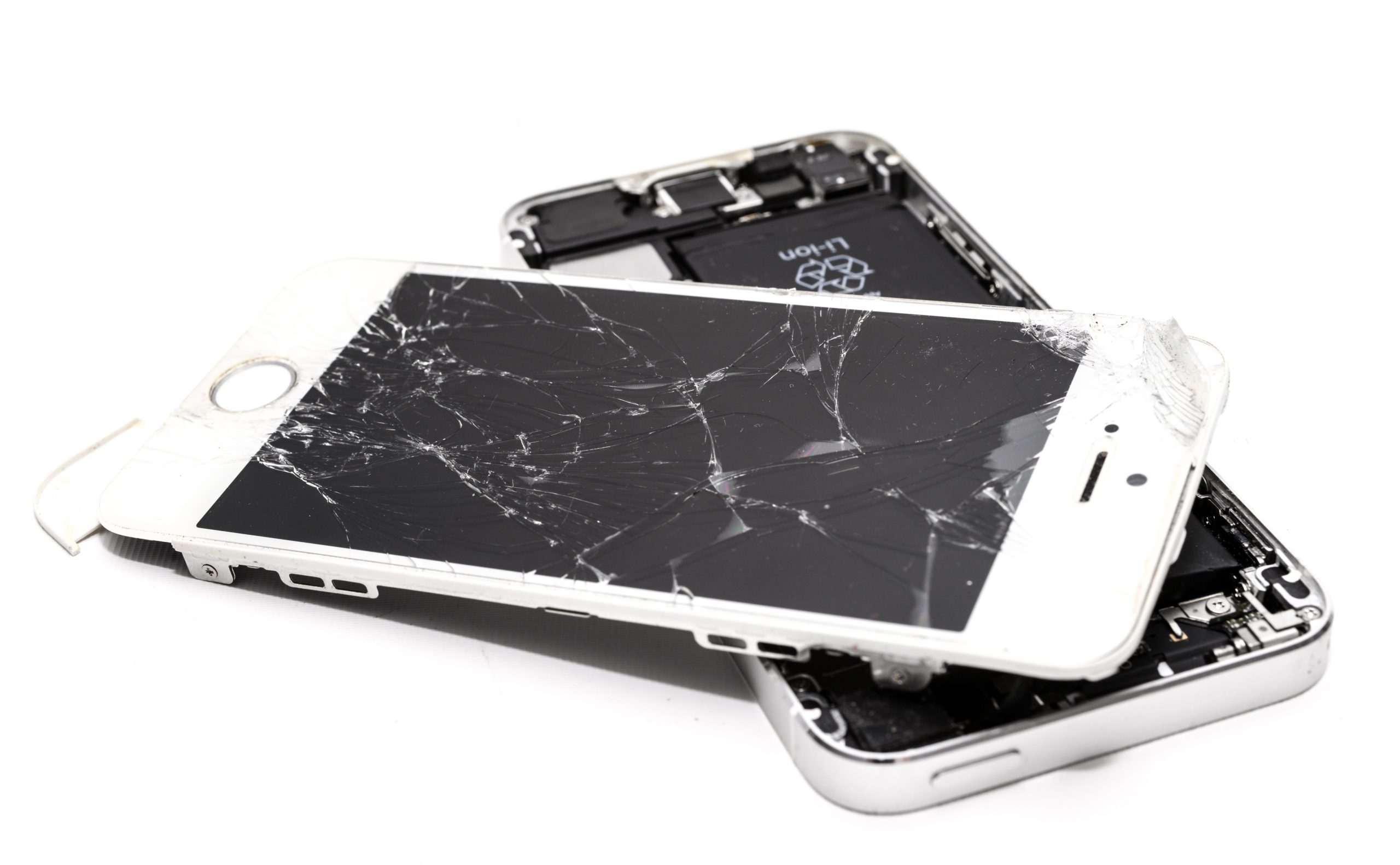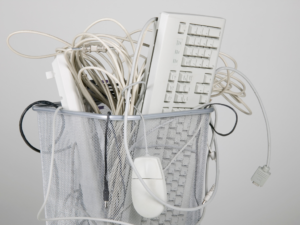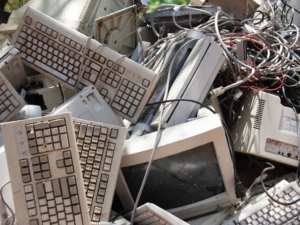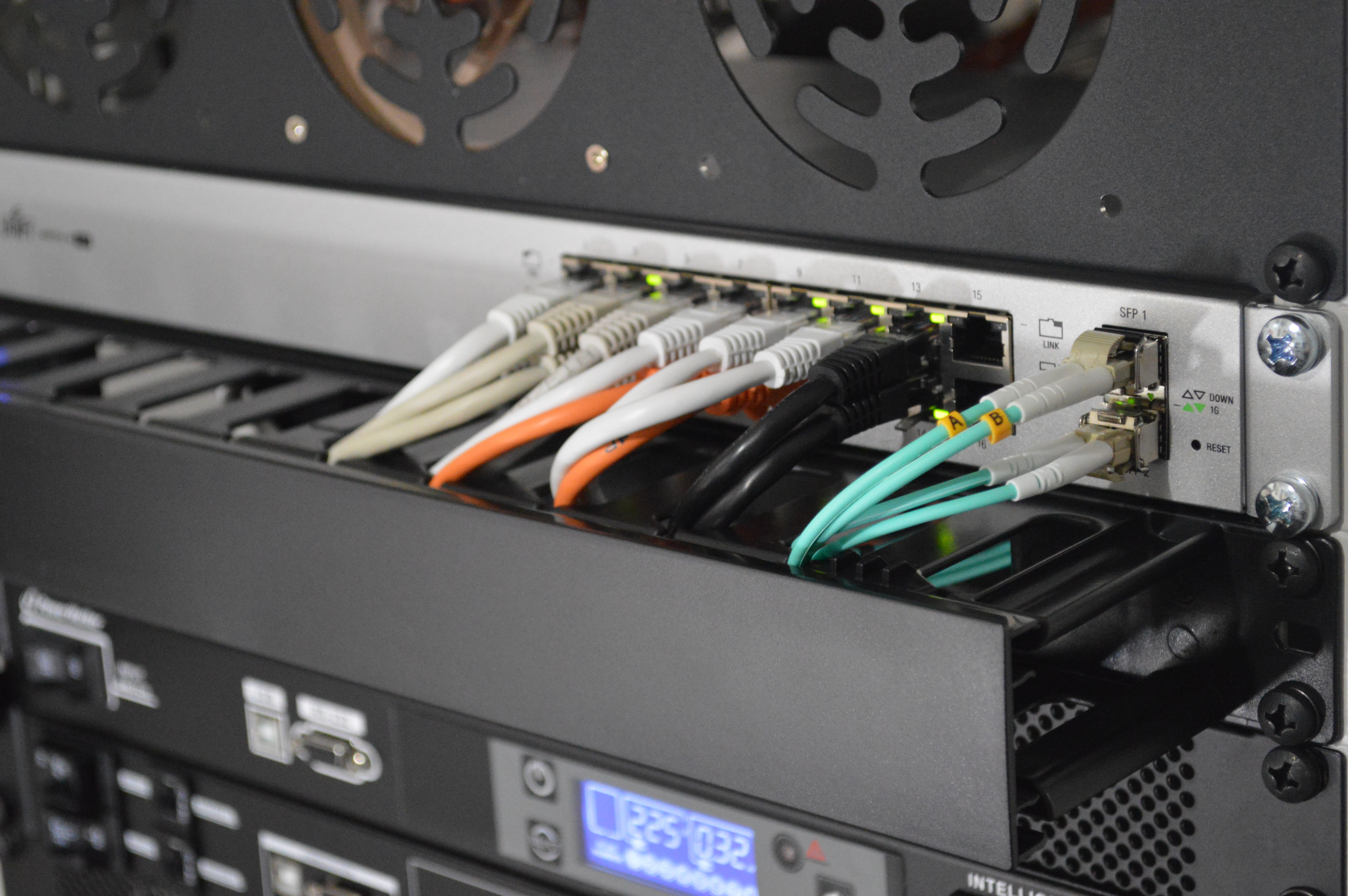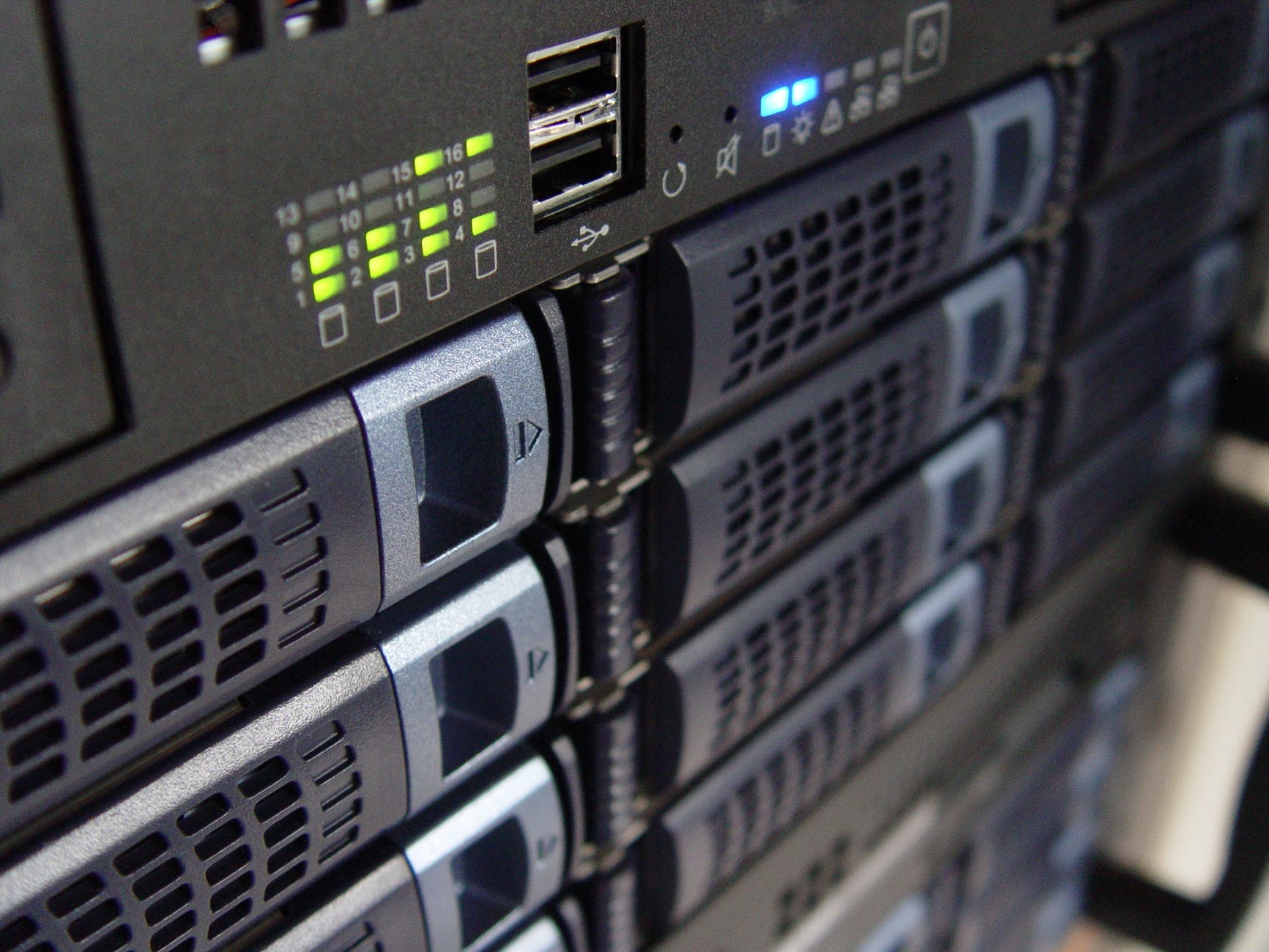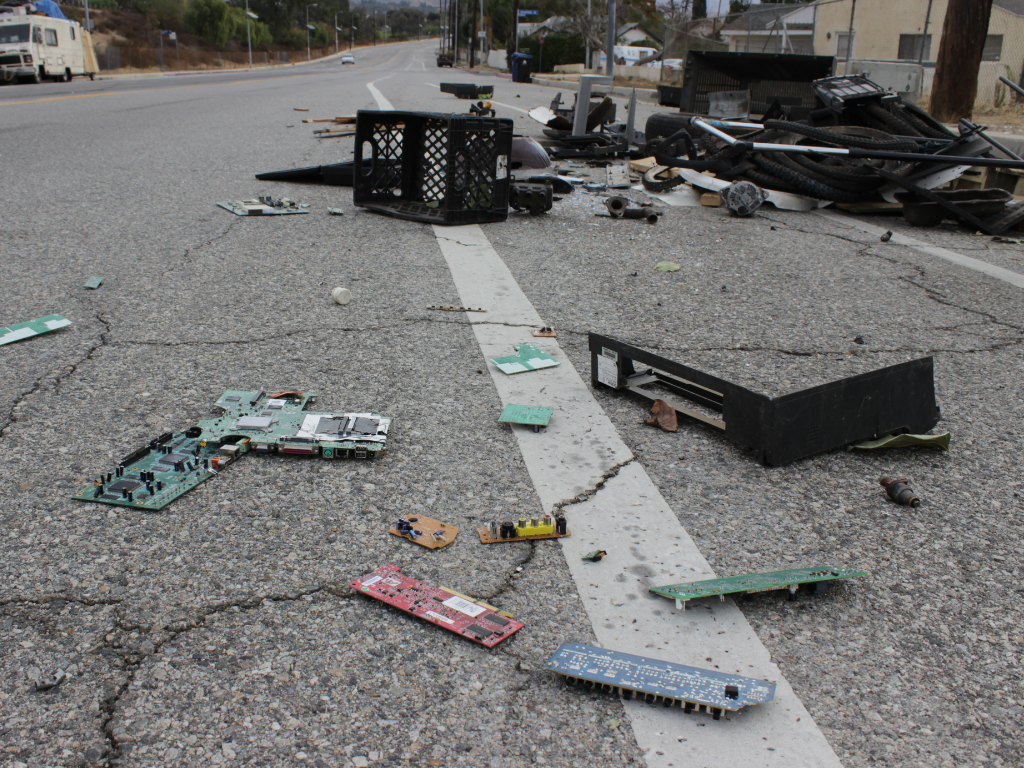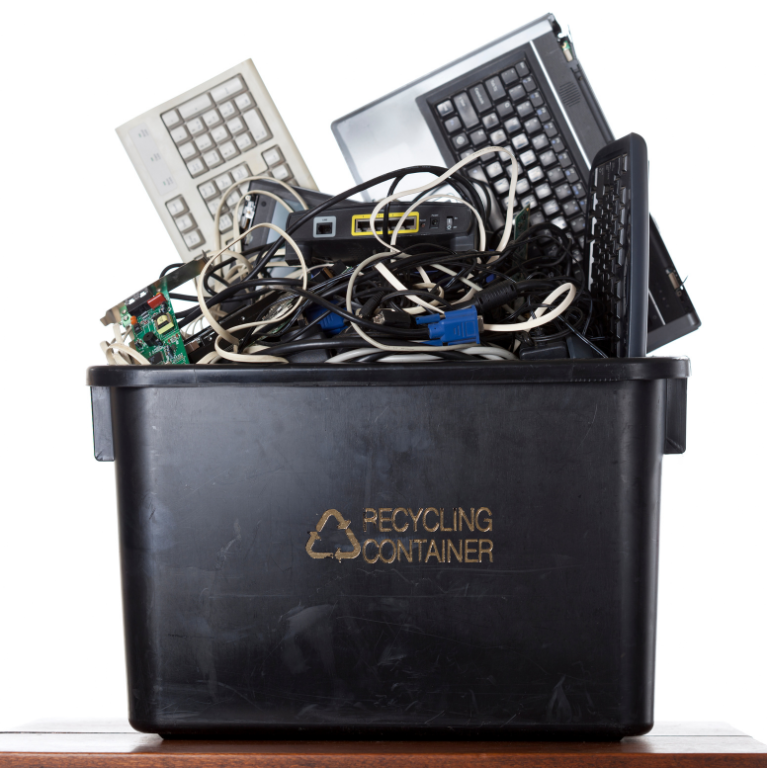Electronic Collection Event | 9/12/2020
Saturday, September 12, 2020, 8:00am-12:00pm
We are Open–We are Collecting–We are Processing!
NewTech Recycling is classified as an “ESSENTIAL BUSINESS” and is open and fully operational throughout this quarantine period. As a value-added service to our local community and surrounding areas, we are opening up our location for Electronic Collection Events over the next few months as local and County governments get back in service.
We are appreciative of the many years of support we have been shown and want to extend this event to the many people looking for a solution to properly recycle their material.
We are Here to Help!
NEWTECH IS PREPARED and our primary focus is public health and safety. Our fully trained staff will be wearing the proper PPE for their protection and those who are coming to drop off.
We will be on-hand to unload cars or guide in the personal unloading if so desired.
Feel free to call with any questions, or if you have a bulk collection need for a business or local entity. (732) 564-3110.
Material Accepted:
- Computers/Laptops/Mainframes/Servers
- Printers/Copiers/Fax Machines
- CRT Televisions & Monitors
- Flat Screen Televisions & Monitors
- Cables & Wiring
- Cell phones & Cell phone batteries
- Keyboards/Mice/Computer Accessories
- VCRs/Cable boxes/Telephones
The Growing Popularity of On-Site Hard Drive Shredding
By Joel Ihnotic - Business Development Manager Newtech Recycling
Do you ever wonder if Onsite Hard Drive Shredding is something your business could benefit from? As we move further into the future, we may find that the reality is inevitable. Thanks to the growth and sophistication of cyber security attacks around the world, witnessed destruction of sensitive media is a valuable option for any sized business to have access to. The ability to physically view and sign-off on the complete elimination of proprietary, business and personal information is a tremendously valuable action that can offer total safety and security. In a regulatory world, the value of proper data destruction is much greater than peace of mind.
Newtech Recycling is a New Jersey based ITAD provider that has embraced hard drive shredding as one of its most important services. Newtech’s mobile hard drive shredding teams and services continues to grow in popularity as our client network evolves and advances. Very few recyclers have the capacity to stay ahead of the regulatory landscape all while continuing an on-going commitment to full compliance in every aspect of the ITAD Industry. We are one of the few and we take tremendous pride in our accomplishments. Each of our certifications, standards, authorizations, permits and ID’s can be found detailed on our webpage in plain view. Our multifaceted management system is strictly followed by our entire organization. Each member of our team adheres to their responsibilities and audits are a daily practice. This special attention to detail is what keeps our teams leaders in the industry. Being at the forefront of compliance and Green initiatives is ultimately what differentiates Newtech from our competitors. We welcome any interested parties to visit our website and learn more.
Our fully trained, certified and insured recycling teams depart our facility every morning to perform specialty hard drive destruction services throughout the northeast. Our flexible nature allows us to customize these services to meet each and every one of our client’s needs. This, coupled with our technician’s extensive knowledge of equipment and procedures, allows our partners to make truly informed decisions on how to proceed with all categories of equipment and sensitive media. We pride ourselves in exceeding the expectations of our extensive network of businesses. This mentality is what has allowed us to grow by leaps and bounds over the past twenty two years.
Imagine the benefits of having a friendly and professional recycling staff actually visit your place of business. Having a team of technicians that can physically see operational gaps and then offer various solutions can be a tremendous help to any organization. Newtech Recycling teams don’t just back their trucks up to your docks. Our all encompassing white glove service covers every single ITAD base. From de-installation and removal of network equipment to inventories and shredding services, Newtech does it all…….everyday.
If you think you are in the market, or maybe soon, we encourage you to contact us and simply ask a few questions. The world is heading in a certain direction. You may be surprised to learn how much we can help.
How do you dispose of old office photocopiers?
In today's rapidly evolving office environments, photocopiers are essential tools that eventually reach the end of their functional life. Disposing of these bulky and complex machines properly is critical, not only for environmental protection but also for complying with various legal and ethical standards. At NewTech Recycling, we specialize in the proper disposal of electronic equipment, including office photocopiers. This guide aims to provide a comprehensive overview of the process, emphasizing our commitment to sustainability and legal compliance.
Photocopiers, like most electronic devices, contain a variety of components that can be harmful to the environment if not disposed of in the right way. These include heavy metals like mercury and lead, and chemicals such as ozone-depleting substances. Improper disposal can lead to these toxic substances creeping into soil and water, posing significant environmental and health risks. Moreover, the legal ramifications of improper disposal can be severe, with businesses facing fines and reputational damage for non-compliance with environmental regulations.
Steps in the Disposal Process:
- Assessment and Documentation: The first step in the disposal process is a thorough assessment of the photocopier. This includes documenting the make, model, and condition, and identifying any hazardous materials that require special handling.
- Data Security Measures: Modern photocopiers often have hard drives or memory storage that contain sensitive information. At NewTech Recycling, we ensure that all data is securely wiped or the storage devices are destroyed to protect your confidential information.
- Dismantling and Sorting: The photocopier is then carefully dismantled. Components are sorted into various categories such as plastics, metals, glass, and specific hazardous materials. This meticulous separation is crucial for the next steps of recycling and disposal.
- Recycling of Materials: Wherever possible, materials are recycled. Metals are sent to smelters, plastics are processed for reuse, and glass is recycled. This not only reduces the environmental impact but also conserves resources.
- Safe Disposal of Hazardous Materials: Hazardous materials are handled in accordance with state and federal regulations. This may involve specialized processes to neutralize the harmful effects before disposal.
- Documentation and Reporting: For business compliance, we provide detailed documentation of the disposal process, including certificates of recycling and data destruction, ensuring your business meets all legal requirements.
The Role of Professional Recycling Services:
Engaging with a professional recycling company like NewTech Recycling is important for several reasons:
- Expertise and Compliance: We have the expertise to handle complex components safely and in compliance with all regulatory requirements.
- Environmental Responsibility: Our processes are designed to minimize environmental impact, aligning with corporate social responsibility goals.
- Convenience and Efficiency: We offer a hassle-free service, handling all aspects of disposal and ensuring minimal disruption to your business operations.
The disposal of old office photocopiers, although challenging, is an essential task that must be approached with responsibility and expertise. At NewTech Recycling, we are committed to providing services that not only meet but exceed environmental and legal standards. By choosing a professional recycling service, businesses can ensure that their old office equipment is disposed of in an environmentally friendly and compliant manner, contributing to a more sustainable future.
Contact us today to learn more about our electronic recycling services and how we can assist your business in responsible disposal practices.
How Do I Destroy a Computer Hard Drive?
When is the Right Time to Truly Kill a Hard Drive?
In today's digital world, the security of your data is of utmost importance. At NewTech Recycling, we are very aware of the necessity for secure handling and destruction of hard drives. Our goal with this guide is to help you determine the most appropriate time for complete hard drive destruction, ensuring that your sensitive information is permanently erased, safeguarding your privacy.
Recognizing the Right Time:
Understanding when to destroy a hard drive is key to maintaining data security. The end of a hard drive's operational life, typically around 3-5 years, is a crucial time to consider its destruction. This age marks an increased risk of failure, making it a prime candidate for secure disposal. Additionally, when you upgrade to a newer computer or storage solution, the destruction of the old hard drive is essential. Even after files are deleted, residual data can remain, and destroying the hard drive ensures this information is completely inaccessible.
Once you have successfully transferred all necessary data to a new device or cloud storage, it's an appropriate time to destroy the old hard drive. This step is vital to eliminate any risk of old data being recovered or misused. If your hard drive has been compromised in any way, such as through a virus, malware, or any form of cyber attack, destroying it is necessary to prevent further security risks.
For businesses, regulatory compliance is another critical factor. Laws and regulations like GDPR or HIPAA often require the complete destruction of hard drives containing sensitive client or patient information. This step is crucial for companies to maintain compliance and protect confidential data. Moreover, if a hard drive shows signs of physical damage or data corruption, and it's not feasible or safe to repair, the safest option is to destroy it to ensure that compromised data is not exploited.
Why Choose NewTech Recycling for Hard Drive Destruction?
At NewTech Recycling, we are experts in the secure destruction of hard drives. Our services ensure that data destruction is both environmentally responsible and compliant with data protection regulations. We employ advanced destruction methods that render data recovery impossible, adhering to industry standards. Our process guarantees the thorough and secure erasure of your confidential information, offering you complete peace of mind.
Determining the right time to destroy a hard drive is essential for ensuring data security and maintaining privacy. NewTech Recycling is committed to providing secure and environmentally responsible hard drive destruction services. Our dedication to data security and environmental stewardship positions us as a trusted partner in handling your digital end-of-life needs. Contact us today to discover more about our services and how we can assist you in the secure and responsible disposal of your hard drives.
6 Handy Tips for Successful IT Asset Disposal and Remarketing
By Chris Keenan
If you’re a CIO, IT director, or just someone put in charge of managing the disposal of your business’s old IT hardware, you must know the importance of proper IT asset disposition (ITAD).
IT asset disposition refers to the practice of reusing, recycling, repurposing, repairing, or disposing of old and unwanted IT equipment safely and environmentally responsibly. Disposing of old IT assets is not as simple as putting unwanted electronics out on garbage day. Not only is it illegal in many states to discard electronics in a landfill, but you must also be wary of compliance and data security breaches.
Fortunately, discarding used equipment doesn’t have to be difficult, either. Keep reading to learn six handy tips that will help you with the IT asset disposal process.
1. Asset Remarketing Adds to the Recoverable Value
All IT equipment either fails or becomes obsolete at some point. The biggest nightmare for an IT manager is a systems or hardware failure. Part of any good IT strategy is to plan for regular upgrades, many IT managers will tell you it’s to ensure the business is benefiting from the best tech, but it’s also to reduce the likelihood of catastrophic hardware meltdowns.
Upgrades have three expenses: hardware, implementation, and disposal. If you add to your upgrade plan a value recovery curve, you can massively reduce the last of those costs.
So, what’s a value recovery curve? Simply put, if you plan to upgrade your IT systems, you should also plan to dispose of the IT assets you’re replacing whilst they still hold a reasonable market value.
Most companies today use IT asset disposition services to generate some revenue from the remarketing of their old IT assets. Items such as used computers, used laptops, old servers, replaced network equipment, and other such IT hardware can hold a good second-hand value. Bringing your upgrade schedule forward by even as little as six months can result in massively increasing the remarketing (reselling) value of your old equipment.
On the other hand, the longer you leave the upgrade, the less value you can hope to recuperate from your obsolete IT hardware. A useful tip is to upgrade every 30 months if you’re on a three-year cycle. If you’re on a five-year cycle, you should consider changing that to four. Keep in mind that most buyers of old or refurbished IT assets are looking for items with at least 18 months of OS support and software relevance.
2. Proper IT Asset Disposition Provides Data Destruction
The most important thing you need to do is destroy all your old hard drives. Here’s the catch: most old IT assets drop massively in value if you’ve destroyed their hard drives. For example, more people are looking to buy second-hand laptops with hard drives than without.
Failure to destroy your hard drives can result in the wrong people getting their hands on sensitive data, and I’m not just talking about business data or data that you are legally required to protect. Personal data, contact data, and even low-level business operations data can be recovered and used to plan devastating cyber-attacks.
So, what’s the solution? Regarding data destruction, most ITAD service providers offer onsite (at your work’s premises) and offsite (a secure data destruction facility that offers advanced hard drive wipes and shredding) hard drive data destruction services.
Companies like Newtech Recycling go one step further: we will help you identify which of your IT assets are worth refurbishing with new drives and which computers can be remarketed without concerns over data breaches. So it’s worth giving Newtech a call before you decide what to do with your old hardware and IT assets.
3. You Can Reduce the Cost of Removal
Deinstallation of IT hardware can be a costly process. You can save a lot if you uninstall and neatly pack the retired hardware yourself.
You wouldn’t be blamed for thinking, ‘that much is obvious,’ but what you may not realize is most ITAD service providers will help you with some really useful things that will minimize or eliminate many of the costs associated with IT asset disposition.
First, ask your ITAD provider if they can pre-supply cages or pallets. Stacking the pallets or filling the cages yourself will save a ton on manual costs. Also, ask your ITAD service provider to send you their default inventory list and fill it out for them. That way, all the ITAD removal manager needs to do is cross-check the list on collection. If managed well, all you’ll be paying for is the pickup charges.m
4. Managing Licenses Gives You an Advantage
If you are thinking of remarketing your retired IT assets, software licenses can make all the difference. Having the original OS for each individual machine that you want to remarket can give you a solid competitive advantage.
Did you also know if you’re reselling your hardware with other used software licenses, this can help the sale to exceed market value? The ECJ decision has legally confirmed that organizations can resell “used” software licenses, regardless of whether they were purchased in a physical form or downloaded from the internet. This is fantastic news for remarketing used IT assets, however, just make sure there’s a chain of accountability.
5. Recycle E-Waste to Eliminate Liability
IT asset remarketing is all well and good, but at some point, IT hardware just reaches the end of its life. When that happens, you need to ensure you have it recycled by an authorized e-waste recycler. Failure to dispose of your IT hardware correctly can cause you and your company major problems.
Here’s what you should look for when choosing an IT asset disposition service:
- The ITAD company managing the disposal of your old IT hardware needs to be either R2 or e-Stewards certified.
- Look for ISO 14001 Certification.
- Ideally, you should look for some degree of state approval, as well as EPA recognition.
- Look at what they are truly able to process. You want a company that can manage all your e-waste, from cabinets to photocopiers and laptops to data centers.
6. Form A Good Partnership
When it comes to the disposal and remarketing of your business’s old IT hardware, you need your ITAD provider to be someone you can trust to get the job done. The East Coast has a booming IT industry and with it are some fantastic ITAD companies. You’ll find companies such as Newtech Recycling, who pride themselves on offering a red-carpet, white-glove service.
Newtech IT Asset Disposition
If you want to dispose of or remarket unwanted IT equipment in the tri-state area, we can help. We have the capability of properly disposing of old computers, printers/copy machines, scientific equipment, and cell phones. We also offer data destruction services to protect personal information.
No matter the size of the project or the type of obsolete technology, Newtech Recycling fulfills every requirement promptly and professionally. For more information on our disposal services, call 732.564.3110.
How would you like your business e-waste & junk computer hardware to be collected and recycled for free?
By James Entwistle
Today's’ businesses are ‘environmentally conscientious’ and are willing to pay for the proper disposal of their e-waste. We all have that cabinet or closet filled with old mice, keyboards, wires, computers, monitors and office printers that are simply collecting dust and costing for storage. To many business owners, office managers and IT directors, it just doesn’t seem worthwhile to have such a small amount of e-waste collected. Many prefer to wait until these obsolete devices are falling out of the cabinet, or breaking the door down to a closet. What if I was to tell you, there is now a way to have all the e-waste in your cabinet or storeroom collected and recycled for FREE, even if it is just a few old keyboards?
For Newtech the term ‘environmentally conscientious’ means giving the business community the cleanest, greenest most cost-efficient means of recycling. This includes finding ways of making recycling more affordable. The good news is, Newtech has managed to do just that through a strategic partnership that eliminates the cost of collection and recycling!
Like all great ideas the partnership is very simple. Newtech has aligned itself with one of the East Coasts largest independent sellers of office supplies & equipment. This is how it works: if you have e-waste (e.g. old computers, IT hardware, monitors and so on) you can have them collected for free the next time you order your office supplies. Not only does it cut the cost of collection, it also cuts your carbon footprint as we’re only using a single vehicle to deliver your order and remove your e-waste. How’s that for a WIN, WIN?
So, what’s the catch? Well, the partnership works both ways, the office supply company is offering to do the collection for free providing Newtech freely recycles for their clients. So that means free collection and free recycling with every order of supplies.
Ok, before you start reaching for the phone to place an order there are four basic requirements. 1. When placing your order, you also need to arrange to have your e-waste collected. If your delivery driver turns up and they are not expecting to collect e-waste there might not be space on the truck. 2. Not all items can be taken free of charge, so you want to call Newtech first to make sure your e-waste can be collected: (732) 564 3110. 3. Some e-waste might require special processes such as data destruction, so when you call Newtech make sure you let them know if your e-waste includes hardware with hard drives (e.g. old laptops & computers). There is a small fee for shredding hard drives but it’s definitely worth the piece of mind. 4. If you have a large amount of e-waste to be processed, recycling fees may be applicable. The key throughout this process is to have open lines of communication with Newtech.
You might be asking yourself: “what’s the name of the office supply company offering this fantastic opportunity”? The answer is: Village Office Supply! Over the past 30 years this local business has offered FREE delivery to hundreds of area businesses. Thanks to this new partnership between Village Office Supply and Newtech Recycling, they can now also offer FREE collection and FREE recycling! If you don’t have an account with them, give them a call today at: (732) 564 1700.
Thank you for choosing to recycle the right way with Newtech Recycling & Village Office Supply!
Is Recycling E-Waste Financially Sustainable?
By Chris Keenan
Pretty much all electronics from your laptop to your phone will at some point become e-waste. You would easily be excused for asking, why is this type of outdated equipment worthy of its own “special” classification? Let’s just say this classification is ‘more preferable to what was originally known as; ‘hazardous electronics containing solid toxic waste’. Of course, the term e-waste, has been created to easily group electrical products that, due to their toxicity, cannot be disposed of in any other way than recycling.
You might be thinking why should we bother to recycle e-waste? It’s a sound question if your knowledge in the subject is limited. Honestly answered, the driving factors behind the motivation for recycling electronics can be boiled down to the 3 following words:
1. Survival
2. Profit
3. Sustainability
Let me give you some examples of how e-waste can affect our survival. We all know that electronics such as computers contain toxins that if ingested can result in brain damage, cancer, and organ failure. I’m not suggesting that there are people out there who are eating their old computers, it’s far worse. It turns out that dumping our e-waste into landfill sites results in toxins seeping into the wider environment. You’ve probably read about the micro plastics recently found in humans. There’s no question the toxification from failing to recycle has already begun. Recycling is our best chance of survival, it prevents and helps to revers the damage caused by these dreadful carcinogenic pollutants.
Making recycling profitable, is an incredibly important contributing factor towards improving the health and prolonged existence of mankind. The desire to profit is an enabling force. In fact, profit is such a strong force some might even say that profits are more of a motivator than fear of death by toxification. That said, the profits from recycling isn’t exactly sending the floor in Wall Street bonkers. We all know that in our capitalistic society if a service or industry can’t afford to pay its costs then it tends to fail. You might be thinking, why doesn’t the government take on the duty of e-waste recycling, surely, it’s far too important to leave it to the free market? In terms of the government managing your recycling think of it like this, would you like to pay more non-negotiable taxes? or would you prefer to use businesses that are constantly investing into making better, more efficient, more affordable ways to recycle? Let’s be honest the governments strengths are in regulating, not innovating.
In terms of societal sustainability playing a factor in recycling it’s important to recognize that for any society to exist three basic requirements must be met. They are simply, the abundance of; food, clothing and shelter. All three of those require land. Food is grown on land, houses are built on land, and the materials for clothing from cotton to leather require land. One of the most land destructive industries known to man is mining! Mining for gold, oil, metals, or silicon all require processes that devastate the environment. Just to produce 1 oz (28g) of gold, takes the removal & destruction of 15,000 lbs (6.8 tonnes) of ore. Worse still are the refining processes which can utilize deadly chemicals and produce huge levels of carbon emissions. One of the worst materials for mining and refining in the world, is aluminum. You’ll find aluminum in most of our electronics.
So, what’s the good news? The good news is that between 98% to 100% of e-waste can be recycled and innovation in recycling technology is booming. Due to a recent advancement in aluminum recycling technology a small-scale recycling facility can reduce its CO2 emissions by as much as, 200,000 tonnes a year! Making recycling massively cleaner and less damaging the mining. Already 1/3rd of the worlds’ gold comes from recycled sources. It is now cheaper to recycle old copper than to mine and extract new copper. 71% of steel waste is recycled and Europe and North America have a lead battery recycling rate close to 100%. This massive degree of recycling success contributes immensely to societal sustainability allowing innovation, job creation, economic stabilization, and cleaner agriculture to flourish.
Who do we thank for this fantastic success? IT directors to facilities managers, from residents to CEO’s, we should thank those who make the choice to recycle.
If recycling is so successful why are companies and tax payers, paying to have their e-waste recycled? The reality is we’re getting better at recycling but the value of what we’re recycling is unstable it goes up and down with the markets. Despite the instability in the markets recycling workers still need to be paid and companies need to keep investing into the technology. With that fact in mind is recycling e-waste only financially sustainable providing we pay for the service to continue? The answer is yes. It’s a service, much like you’d pay to have your old car toed away or pay to have your trash taken. The sales of reclaimed materials just helps to subsidise the service.
The Future of Monitor Recycling
By Chris Keenan
Back in 1998, I was invited to consult for a fantastic, young company based in Cambridge (UK). As you probably know, Cambridge is famous for some extraordinary scientists, such as Isaac Newton and the late Stephen Hawking. This young company was no exception to the fantastic scientific achievements that had gone before it. The company’s invention was so leading edge, that we first got a glimpse of the Tech in the James Bond movie ‘Die Another Day’ as the invisible car. We also saw the technology appearing as a futuristic monitor in the sci-fi movie Minority Report.
If you’ve not guessed it already, the invention is called ‘light emitting polymer’ and the company is called Cambridge Display Technology (CDT). So, what’s the big deal? Well apart from invisible cars, you can have wall paper that changes its pattern on request, to anything. It can even make wallpaper into a TV set. That’s not all, the invention doesn’t just make excellent monitors, it also makes excellent computers. In essence it means your computer and monitor can become the same thing (a bit like an iPad or computer tablet), with one big difference: your computer and monitor can be as thin, as a sheet of paper!
Lord Young of Graffham, first bought into the company for a rumored $100K, then helped to raise a £6.6m investment to help get the Tech patented. CDT was originally a spin-off company from Cambridge University, so that kind of money seemed amazing, however that was just the tip of the chocolate bar. Today the company is on the NASDAQ and worth $100’s of millions. LG display (shown in the above video) have invested heavily into CDT and so have a multitude of other big names. Sounds amazing so far, right?
At this point you should have two questions on your mind: 1. If this company has been about since the 1990’s, then why don’t we already have paper-thin all-in-one computers already? 2. How would you power such a thing? I mean it’s a great idea but we’ve all seen the batteries needed for an iPad, wouldn’t this invention be restricted by its need for electricity? Let me answer the second question first, it turns out those mad boffins in Cambridge have also developed energy harvesting and storage systems that make the technical schematics for the latest smartphone look like cave paintings. Ok, so where are our flat computers? Good question! It turns out that technology this advanced usually takes about 40 years before it’s perfected enough to hit the civilian population. That puts us in the 2030’s before we can expect TV wallpaper. Better not start a line just yet.
One thing is for sure, when CDT’s inspired new hardware hits the streets, it will destroy the computer e-waste problem overnight! That said, by the time we see flat computers, we’ll probably have a new e-waste industry recycling electric cars. The bottom line is, whether it’s today or some time in the future, we’ve got some great stuff to look forward too.
What to do with old servers?
By Chris Keenan
There are currently over 7 billion people on the planet. At the turn of the new millennium (2000 AD) only 300 million people were connected to the Internet. Today the global digital online population has reached a staggering 4.2 billion.
You couldn’t be blamed for thinking that these types of stats are about as useful as having a snooze button on a smoke alarm. However, if you’re a CIO, IT director, or IT manager who understands computer network technology you’ll probably be wondering what it takes to keep over 4 billion people connected. In short, the answer is roughly 75 million servers with 550,000 miles of undersea cable, transmitting data at 186,000 miles per second, oh and about 5 billion internet capable devices, ranging from your laptop to your smart phone.
I think we can all agree the general lifespan of the average server is about 3-5 years, depending on the usage. If that is the case then over the course of the next year, there will be approximately 15 to 20 million network servers being replaced. If you’re in charge of managing a server network you might be asking yourself is there any value in reselling these old servers? Well, as you can imagine with millions of second-hand servers out there, the remarketing value of your old server is pretty low. In fact, a server that you spent up to $5,000 on 4 years ago can be worth less than 100 dollars today and that’s only if you manage to resell it.
It is possible to asset strip an old server by selling its RAM, processors, motherboards and so on. If you have the time to take apart a server and remarket each component you might see as much as $300 from your old machine. In most cases obsolete servers are just too much of a hassle or take too long to sell. IT directors have more important things to do with their time. The reality is when it comes to replacing old servers most CIO and IT professionals are just concerned about 3 things:
1. Certified data destruction of the server hard drives.
2. Quick, reliable, and secure removal of obsolete IT assets.
3. The legal disposal of servers.
In terms of certified data destruction, it is not commonly known by the general public, but an IT manager might lose more than just his job over failing to destroy his company’s hard drives correctly. Failure to destroy a hard drive can have grave legal consequences. Obviously, most CIO’s tend to request that hard drives are shredded regardless of what’s on them, just to be safe.
You might think it strange that the second most important thing on a CIO’s mind is a quick and reliable removal service? Changing out hardware or upgrading a server room is incredibly time sensitive and space critical. The last thing an IT manager or CIO wants, is to have the old equipment blocking up the hall ways, slowing everyone down. A fast, reliable and secure removal service, can make all the difference to a successful data center / cloud upgrade.
Lastly, the legal disposal of servers translates to just one thing, namely: ‘recycling’. Today, most of us understand the necessity to recycle. Just in case you don’t know why server recycling is so important, it might be worth noting that if we don’t recycle servers’ we need to find a hole big enough to put 20+ million of them in each year. With that said, is recycling servers really environmentally friendly, or does recycling produce more carbon emissions and use even more deadly chemicals in the process? Thankfully, recycling produces less carbon emissions than the mining and refining process used in creating new materials. So, it’s not only cheaper to recycle, it’s also cleaner. Even separating the metals from complex components such as motherboards can be achieved by using fine shredding and water separation (it’s a process a lot like panning) where no chemicals are required.
You might be asking yourself what’s the financial value of a recycled server? The answer depends on the type of server. There is gold in most servers but it’s in such a small quantity it doesn’t really cover the cost of labor or the running of recycling machinery. So how do we recycle old servers if it’s not that profitable? Most recyclers charge a fee to recycle. However, if you have newer servers that can be resold then the fee for recycling can be offset against the sales profits. Sometimes, this approach can even result in you getting paid to recycle.
To find out more, call Newtech Recycling today at 732-564-3110 or get a free, instant online estimate CLICK HERE.
What is the Importance of Responsible Electronics Recycling?
By Joel Ihnotic
As we continue our journey into the future, uncertainty exists around every bend. Where are we headed, and what will the world be like 20, 50, or even 100 years from now? What kinds of jobs will our children and grandchildren be working?
The pace of advancements in science and technology makes it virtually impossible to predict the next generation’s job market. In fact, some experts are saying that the most popular job in the year 2035 doesn’t even exist yet. It’s crazy to think that, but it makes sense if you simply consider what’s taken place over the past 20 years.
Although it may not be the most popular career choice in 2035, one job category that will almost certainly remain relevant is e-scrap and everything surrounding it.
Responsible Electronics Recycling is a Growing Field
Technologies are turning over quickly these days, and manufacturers are pumping out more and more products to keep their grasp on the growing number of consumers. Just look at cell phones, televisions, and computers: newer and “better” models are continually being released, and consumers are constantly upgrading. This reality isn’t ending anytime soon, and responsible electronics recyclers know this.
As products evolve and volumes increase, so do the number of e-waste recyclers. Barriers to entering the e-scrap market are relatively modest and can be offset by various revenue streams. This is why we caution our partners and encourage everyone to perform due diligence on the recyclers they wish to utilize. Remember that not every business practices responsible e-waste recycling.
How Can You Identify Responsible Electronics Recycling?
It seems like new e-waste recycling outfits are popping up every week and offering tremendous deals for business equipment. I see it almost daily. I also see where products and components end up. It’s incredibly important that everyone is weary of these typically un-certified and unapproved fly-by-night operations that hit and run.
If you’re hiring a business to handle your e-waste, you likely care where it ends up. Nobody wants to pollute the soil and groundwater intentionally. However, if the firm you choose does not practice responsible electronics recycling, your old office electronics could wind up exactly where you didn’t want to.
When choosing an electronic recycling company, look for one that is certified. Certified electronics recyclers must demonstrate to an accredited, independent third-party auditor that they meet specific standards to recycle and manage electronics safely. Certified electronics recyclers have demonstrated that they continually meet specific environmental standards and safely manage e-waste.
Here at Newtech Recycling, we embrace the challenge of competing with phony operations at many levels by promoting a safe, sound, and fully certified business model. This ideology of doing things the right way and investing in partnerships has allowed us to grow every year since 1995.
R2 Responsible Electronics Recycling
The Responsible Recycling ("R2") Standard for Electronics Recyclers is one of two accredited certification standards. R2 is the leading standard for electronics repair and recycling, and this standard is rigorously audited for quality, safety, and transparency. When looking for a responsible e-waste recycler, it is always a safe bet to choose one that is R2 certified.
As an R2:2013 recycler, we are tied to a level of quality and security that our extensive network of clients needs and deserves. This mentality carries over to our staff, who enjoy superior standards for worker health and safety.
Our operation is audited almost daily on an internal basis and by internationally accredited forums multiple times per year. These third-party groups host intense multi-stage audits that diligently review our internal procedures and materials management practices.
Although costly, these visits ensure that our clients and staff receive the gold standard across the spectrum of e-scrap and e-waste services. Our auditors also provide forward ideas towards best management practices that benefit our internal staff members, logistics teams, facility grounds, and our surrounding community.
Find R2 Responsible Electronics Recycling at Newtech
Anytime a business or individual partners with a certified e-waste recycler, the world becomes a greener place. We want nothing more than for every person, place, and thing to benefit from the highest standard of care our industry has to offer.
This is who we are at Newtech Recycling, a trusted name in R2 responsible electronics recycling that truly values safety, security, and quality service. We’re here, we’re certified, and we love what we do. To learn more, please feel free to call us at 732-564-3110. We currently offer services to New Jersey, Pennsylvania, New York, and Connecticut.


